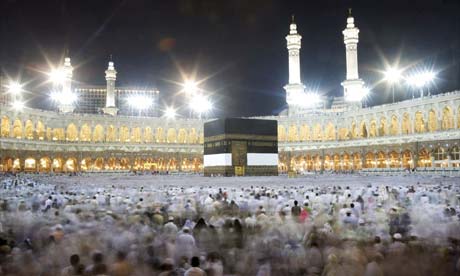Warning over Hajj pilgrimage rip-offs

Hotel and flight deals can cost more than £3,000, and every year hundreds fall victim to a variety of scams: paying for a five-star hotel near the Masjid al-Haram (the mosque that is a focal point of the event), but getting a tiny room far from the centre of Mecca; visas and flight tickets not arriving; and in extreme cases agents disappearing with their money.
Consumer affairs minister Gareth Thomas convened a conference of travel agents, community groups and consumer organisations last month, and told them that the government aimed to 'help pilgrims avoid booking with rogue travel agents, and to get redress when they fall foul of those who break the law'.
The Department for Business, Enterprise and Regulatory Reform is planning a poster campaign in community centres and mosques aimed at improving awareness of consumer rights, and stressing the need to check that a tour operator to December's Hajj holds an Air Travel Organiser's Licence (Atol), that any company booked with is a member of a trade organisation such as Abta and to keep all documents such as contracts and invoices in case of later problems.
One of the groups that flagged up the problem, the Association of British Hujjaj, welcomed the move, saying the 'vast majority' of Hajj travel operators were one-man operations and 'simply opportunists who are looking for monetary gain by taking advantage of the vulnerable'. Last year, it handed a petition signed by 5,000 Hajj travellers to the government.
Dr Nadim Nayyar, from Liversedge in West Yorkshire, booked last year through a Luton-based firm, Go4 Hajj. His party of nine paid for a luxury package costing £32,000. Just 48 hours before they were due to depart, Nayyar discovered their Saudi Arabian visas had not been obtained by the company. 'Our Hajj was over. I felt totally devastated,' he said.
'The pre-Hajj seminar, where we were supposed to meet other travellers, kept on getting delayed. Then we found that our flights had been altered from scheduled to chartered, changing in Bahrain. Then we found out they couldn't get the five-star hotels they had promised, and we were being downgraded.'
After learning that their trip was cancelled, Nayyar and 60 other pilgrims who had been let down were told the firm had no assets left to refund them, although he eventually recovered his money through Go4 Hajj's Atol cover.
'This is not just a package holiday, but an obligatory religious visit, so people tend to be far too trusting,' said Nayyar. 'I think that's where we fell down.'



